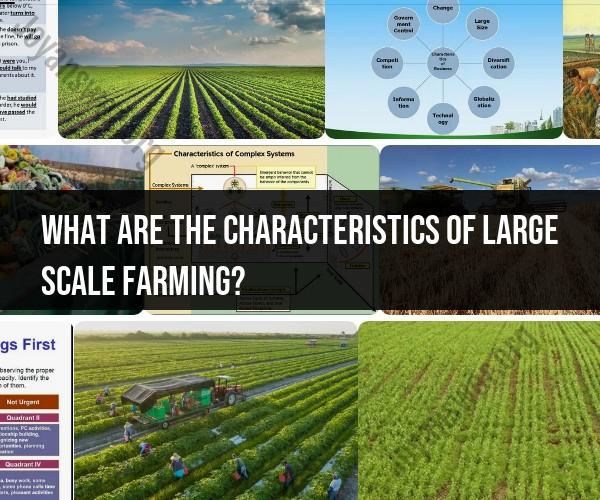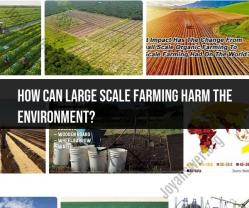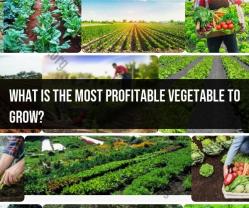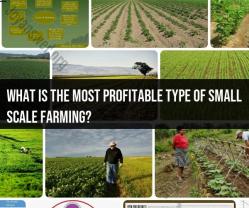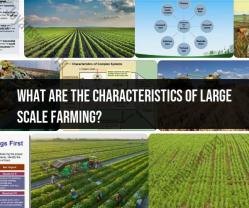What are the characteristics of large scale farming?
Large-scale farming, often referred to as commercial or industrial farming, involves the cultivation of crops and/or raising of livestock on a much larger and more extensive scale compared to small-scale or subsistence farming. Characteristics of large-scale farming include:
Size of Operations: Large-scale farms typically cover a significant amount of land. The size can vary greatly, but they often encompass hundreds or thousands of acres or hectares.
Mechanization: Large-scale farms heavily rely on modern agricultural machinery and technology. Tractors, combine harvesters, irrigation systems, and other specialized equipment are used to streamline and automate various farming tasks.
Specialization: Large-scale farms often focus on the cultivation of specific crops or the production of particular livestock species. This specialization allows for efficient management and optimization of resources.
Economies of Scale: Large-scale farming benefits from economies of scale. By producing in bulk, these farms can often reduce production costs per unit, making them more cost-effective compared to smaller operations.
Crop Monoculture: Some large-scale farms practice monoculture, where a single crop is grown on a large portion of the land. This can maximize efficiency but may also be associated with potential risks, such as pest and disease susceptibility.
Livestock Intensification: In the case of large-scale livestock farming, animals are often raised in confinement systems, such as feedlots or large poultry houses, to maximize production efficiency. This can involve high stocking densities and controlled environments.
Use of Agrochemicals: Large-scale farms may employ the extensive use of fertilizers, pesticides, and herbicides to enhance crop yields and protect against pests and diseases.
Crop Genetics: Adoption of genetically modified (GM) crops is common in large-scale farming. GM crops are engineered to have specific traits, such as resistance to pests or herbicides, which can increase yield and reduce production costs.
Market Orientation: Large-scale farms are usually market-oriented. They produce crops and livestock primarily for sale in commercial markets, rather than for personal consumption.
Access to Capital: These farms often have access to substantial financial resources and credit, allowing them to invest in infrastructure, technology, and inputs.
Environmental Impact: Large-scale farming can have a significant environmental impact, including concerns about deforestation, soil degradation, water pollution, and greenhouse gas emissions. Sustainable practices are increasingly being adopted to address these issues.
Labor Force: While large-scale farms can employ a significant number of workers, they often require fewer laborers compared to traditional small-scale agriculture due to mechanization and automation.
Global Reach: Some large-scale farms engage in international trade, exporting their agricultural products to global markets.
Corporate Ownership: Many large-scale farms are owned or operated by agribusiness corporations, which can influence agricultural policies and practices.
It's important to note that large-scale farming practices and their impacts can vary widely depending on factors such as the type of crops or livestock being produced, geographic location, regulatory frameworks, and the adoption of sustainable and responsible agricultural practices. Balancing the need for increased food production with environmental sustainability and social considerations is a key challenge in large-scale farming.
Large-Scale Farming: Identifying Key Characteristics and Operations
Large-scale farming is a type of agriculture that involves the production of crops or livestock on a large scale. Large-scale farms typically use advanced technologies and machinery to produce large quantities of food at a low cost.
Some of the key characteristics of large-scale farming include:
- Large land area: Large-scale farms typically have a large land area, often hundreds or even thousands of acres. This allows them to produce large quantities of food.
- High capital investment: Large-scale farms require a high capital investment in land, machinery, and equipment. This is because they need to be able to produce large quantities of food efficiently.
- Use of technology: Large-scale farms often use advanced technologies, such as GPS-guided tractors and computer-controlled irrigation systems, to improve efficiency and productivity.
- Monoculture: Large-scale farms often practice monoculture, which is the cultivation of a single crop or type of livestock on a large area. This can be less sustainable than other agricultural practices, but it can also be more efficient.
Some of the common operations on large-scale farms include:
- Crop production: Large-scale crop farms typically produce a single crop, such as corn, soybeans, or wheat. They use advanced technologies and machinery to plant, harvest, and process their crops.
- Livestock production: Large-scale livestock farms typically raise a single type of livestock, such as cattle, hogs, or chickens. They use advanced technologies and machinery to feed, care for, and slaughter their livestock.
The Anatomy of Industrial Agriculture: Understanding Large-Scale Farming
Industrial agriculture is a system of large-scale farming that is focused on producing large quantities of food at a low cost. It is characterized by the use of advanced technologies, machinery, and chemicals.
Large-scale farming has a number of advantages. It can produce large quantities of food at a low cost, which makes it possible to feed a growing population. It can also help to improve food security and reduce poverty.
However, large-scale farming also has a number of disadvantages. It can lead to environmental problems, such as water pollution and soil erosion. It can also contribute to climate change.
Efficiency and Challenges: Examining the Traits of Large-Scale Farming
Large-scale farming is a very efficient way to produce food. By using advanced technologies and machinery, large-scale farms can produce large quantities of food at a low cost.
However, large-scale farming also faces a number of challenges. One challenge is that it can be difficult for small farmers to compete with large-scale farms. Another challenge is that large-scale farming can have a negative impact on the environment.
Despite these challenges, large-scale farming is an important part of the global food system. It plays a vital role in feeding the world's growing population.
Overall, large-scale farming is a complex and multifaceted topic. It has both advantages and disadvantages. It is important to weigh the pros and cons of large-scale farming when making decisions about food policy.
